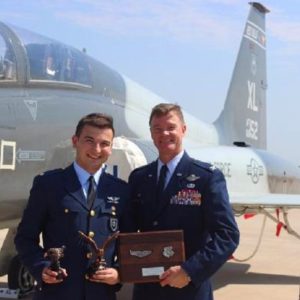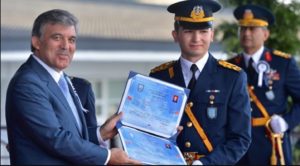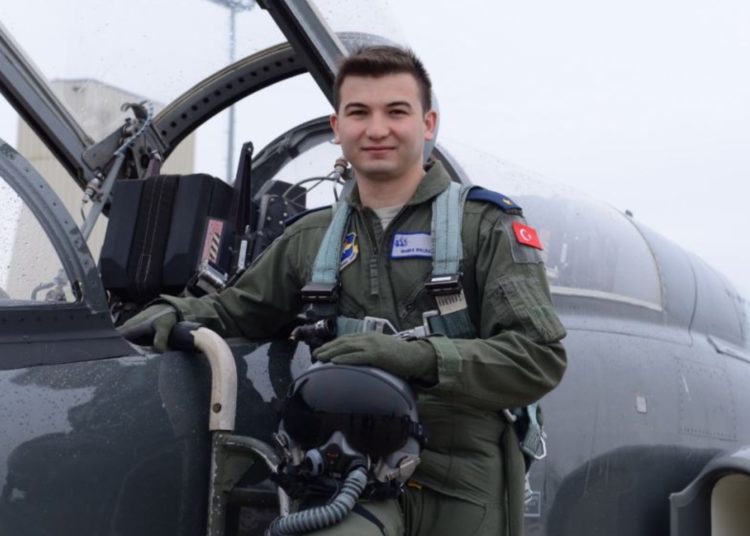Abdullah Bozkurt/Stockholm
Turkey jailed one of its the best and brightest lieutenants who was on his way to becoming a top-gun combat pilot after receiving multiple awards from the US Air Force for his excellent performance in a training program.
Buğra Baldan, a 30-year-old lieutenant who was condemned to life in prison on bogus charges, made the headlines in Turkey in 2015 when he collected three awards — Top Stick (flight performance and flight scores), Distinguished Graduate (for academic training, flight discipline and basic military qualifications) and the Air Training Commander’s Trophy – in the US.
Recognized for his outstanding performance in the Euro-NATO Joint Jet Pilot Training Program (ENJJPT), he accepted his awards at a special ceremony held at Laughlin Air Force Base, located in Del Rio, Texas, on August 14, 2015. ENJJPT is the world’s only multi-nationally manned and managed flying training program chartered to produce combat pilots for NATO. The program is run by the 80th Flying Training Wing at Sheppard Air Force Base in Texas and trains about 200 student pilots annually.
Baldan is one of hundreds of combat pilots who were purged and/or imprisoned by the Islamist government of the President Recep Tayyip Erdoğan in the aftermath of a false flag coup event in 2016, leaving the Turkish Air Force crippled by a huge shortage of pilots. Four in every five pilots in the Turkish Air Force were dismissed and/or jailed by the government, which carried out unprecedented dismissals of pro-NATO and pro-Western officers in NATO’s second largest army.
Buğra Baldan’s court testimony revealed how the prosecutor’s case was based on dubious evidence:
Graduating at the top of his class at the Air Force Academy in 2013, Baldan scored very well in the language competency exam conducted by the Office of Defense Cooperation Turkey (ODC-T), which is a US Security Assistance Organization (SAO) to Turkey. In April 2014 he was sent to Laughlin US Air Force Base for a pilot training program and completed it with an excellent record. Laughlin nominated him as pilot of the year, which was approved by the US Air Force, according to Baldan’s testimony.
He returned to Turkey in February 2016 and continued his training in flying F-16s at the Ankara 4th Jet Base Command, located at Akıncı Air Base, the alleged center of putschist attempt, according to the government. As a trainee pilot for six months, Baldan had worked hard to keep up his excellent track record and was about to finish the last part of his training as an F-16 combat pilot in Ankara.
The morning of July 15, 2016 was not unusual for him when he went to the base at 8 a.m. and spent the entire morning studying for an exam scheduled for Monday. He planned to spend the weekend with his girlfriend in Konya, some two hours by train from his base. He bought a ticket for 6:40 p.m. train and told the love of his life that he was looking forward to seeing her again.

After the flag ceremony at 1:30 p.m., which was standard for trainee pilots on Friday afternoons, they were asked to stay for a social gathering by the fleet commander, Maj. Mustafa Azimetli. Baldan thought this was like the many cocktail parties he had attended in the past to acknowledge the performance of pilots in training such as successfully pulling 9G – a high-speed stress trial on a jet that translates into more 2,000 pounds of stress on the pilot’s body.
While they were waiting for the event, all pilots were scrambled as part of a counterterrorism (Terörle Mücadele Harekatı, or TMH) mission. Veteran combat pilots who had already left the base or were on leave were recalled on emergency orders to fly warplanes in the mission. In past TMH missions, trainee pilots were allowed to remain to observe maverick pilots, learn the procedures and if needed help with errands on the ground. They were not allowed to fly any planes for actual missions. As a result Baldan and the other students stayed at the base.
For Baldan this was the first TMH mission he would observe. He was assigned to what he called a desk unit that functioned as an internal system for members of the 143rd fleet to reach out to one another. His job was to make announcements from the mic when needed. He had been at the desk for 40 minutes and never made an announcement. For the remainder of his stay, he wandered around, watched “The Dark Knight” in the mess hall with his buddies to kill the time and slept for few hours.
The train ticket Buğra Baldan bought to go to Konya to spend the weekend with his girlfriend. He had no prior knowledge about a military mobilization on July 15, 2016:
In the meantime, his angry girlfriend who did not know what was happening in Ankara was waiting at the Konya train station for Baldan’s arrival and thought she had been stood up. As mobile phones were collected for the security of the mission at the base, Baldan was unable to call his girlfriend to let her know that he couldn’t make it. His phone kept receiving angry messages from her, but he was unable to read them. In his defense, Baldan displayed the train ticket he bought that day to prove that he had no prior knowledge of what would happen at the base that night.
He was not involved in any of the chaotic events on the night of July 15 or the early morning hours of the next day. He stayed clear of what was happening and had to spend the entire night at the base trying to make sense of what was unfolding. At his young age he had never before seen a coup and thought his commanders were handling and managing the developing situation.
In the morning he went home and checked in every day with his commanding officer, who asked them to stay at home for the time being. On July 27 he was asked to come in to the base and give a statement on what he had experienced on July 15. He never thought he would be a suspect when he reported to the base. With no questions asked, the police detained him and took him to the football field of a police academy located in in Ankara’s Kızılay neighborhood. He was subjected abuse and ill-treatment for 10 days in the field. At the end, he was formally arrested at arraignment.

The evidence presented against him by the prosecutor to support the charges of coup plotting, membership in a terrorist group and manslaughter lacked credibility and was totally unconvincing. Phone calls he made to Kazakhstan on July 16 and 17, 2016 were found by the prosecutor as suspicious and entered into evidence against him to support the coup conspiracy.
In his defense statement at the Ankara 4th High Criminal Court on November 7, 2017 Baldan explained that the phone numbers in the court records actually belonged to his father, who has been living as a migrant worker in Kazakhstan for the last 10 years. An accountant by profession, his father was working away from home and sending remittances to the family back in Turkey. Baldan even submitted the phone bills of his father’s cell phone from Kazakhstan to prove his point while expressing dismay at the prosecutor’s lack of due diligence in drafting the indictment.
Photos extracted from CCTV recordings at the base were more evidence. Baldan said it was normal for him to be at the base where he had been going through a combat pilot training program. He said did not understand why the prosecutor put photos of him walking in the halls of the building assigned to trainees as criminal evidence.

Another piece of evidence against him was a WhatsApp group set up by the 2009 graduates of the prestigious Kuleli Military High School in order to stay in contact. The prosecutor alleged that the communications were part of the coup plot when Baldan did not even have access to his phone during the July 15 events. His helping out a buddy who was short on cash after purchasing a new car was also presented as criminal evidence against him.
He maintained his innocence during the trial, but his calls fell on deaf ears of the three judges that oversaw the proceedings. The prosecutor alleged he was a Gülenist, a group that is critical of President Erdoğan on a range of issues from pervasive corruption in the administration to Turkey’s aiding and abetting of armed jihadist groups. Being a highly successful student and well versed in foreign language was one of the criteria applied to identify alleged Gülenists in the Turkish military. He said he had worked hard to get where he was and had nothing to do with the group.
Despite the lack of solid evidence to warrant any charges against him, the court in November 2020 convicted him and sentenced him to life in prison at the end of a sham trial.
Buğra Baldan’s presence at the base where he was assigned to work as student pilot presented as criminal evidence against him:
As a result the air force lost one of the best student pilots. But he was not an exception to the terrible story. Even before the purge the air force was experiencing a pilot shortage that has only become worse since then.
According to the air force’s own internal report dated January 19, 2016, the military needed 554 new pilots including 190 combat pilots to reach its normal level. Departures had already brought the ratio of pilots to aircraft to 0.65, which is dangerously low, in 2014. The commanders urged the government to take immediate measures to raise the ratio and delay departures from the force by adopting incentives, extending compulsory service and offering other attractive options.
As of May 2016, the air force had 1,275 pilots in total with 378 combat pilots who were assigned to fly F-16s and F-4s. However the mass purge in the aftermath of the false flag coup dealt a further setback to the air force. The government did not officially announce how many pilots it had purged from the air force in the aftermath of the failed putsch, but the figures reported in the Turkish media ranged from 600 to 716. This means the air force had a shortage of 1,154 pilots by January 2017, and there was no way to compensate for such a huge loss. The ratio of pilots to aircraft dropped to 0.37.
The Turkish defense minister admitted in July 2018 that one pilot had to carry out the assignments of five because of the acute shortage. Turkey tried to recruit Pakistani pilots as trainers on F-16s, but that was rejected by the US, which has the right to approve third-country access to F-16s based on bilateral contract terms.













